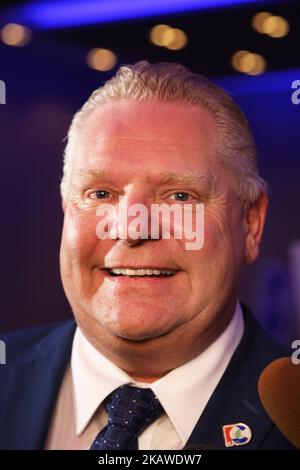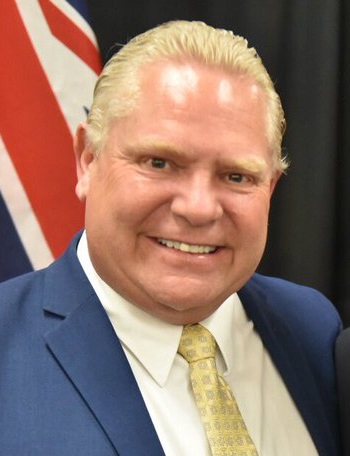Is Doug Ford, the Premier of Ontario, a man of the people or a political maverick? His tenure has been marked by bold decisions, a direct communication style, and a willingness to challenge established norms, making him a figure of both staunch support and vocal criticism.
The political landscape of Canada, and specifically the province of Ontario, has been significantly shaped by the actions and policies of Doug Ford. His leadership has been characterized by a blend of conservative principles and populist rhetoric, resonating with a segment of the population while simultaneously drawing opposition from others. His approach, often described as blunt and decisive, has frequently put him at odds with both domestic and international players, most notably during strained relations with the United States under the Trump administration. These tensions have often been brought to the forefront, demonstrating Ford's willingness to defend Ontario's interests on the global stage.
| Category | Details |
|---|---|
| Full Name | Douglas Robert Ford Jr. |
| Date of Birth | November 20, 1964 |
| Place of Birth | Etobicoke, Ontario, Canada |
| Education | Humber College (Attended, but did not graduate) |
| Political Party | Progressive Conservative Party of Ontario |
| Political Positions Held | Premier of Ontario (2018-Present), Toronto City Councillor (2010-2014) |
| Key Policies | Cancellation of Cap-and-Trade, Review of Therme's Toronto project, Focus on economic development, Infrastructure investment. |
| Family | Married to Karla Ford, with four daughters. |
| Business Career | Prior to entering politics, Ford was a businessman. He was the co-owner of Deco Labels & Tags, a family-owned label and packaging business. |
| Controversies | Criticism of the Therme Toronto project, various policy decisions, and his relationship with his brother Rob Ford. |
| Website | Legislative Assembly of Ontario |
Ford's tenure as Premier has been marked by a series of significant policy shifts. One of his earliest and most impactful decisions was the cancellation of Ontario's cap-and-trade program, a move that drew both praise and criticism. Proponents argued that this would reduce costs for businesses and consumers, while opponents raised concerns about its impact on climate change initiatives. This action underscored Ford's commitment to his campaign promises and his willingness to dismantle policies implemented by the previous government.
The Premier's approach to international relations has also been noteworthy. During periods of strained relations between Canada and the United States, Ford frequently took a direct approach, advocating for Ontario's interests. This included discussions with high-level US officials, reflecting his willingness to engage directly with key players on the global stage. His stance, particularly when dealing with trade matters, often highlighted a strong defense of Ontario's economic position and its relationship with the United States, and he frequently appeared on major US networks to speak directly to Americans about his province's positions.
Ford's government also initiated a review of the controversial Therme Toronto project, a major waterfront development. The Premier's decision to examine the terms of the 95-year lease granted to the European wellness company came after increased scrutiny, reflecting a commitment to transparency and accountability, and an effort to ensure that large-scale projects meet public expectations. His actions underscore his interest in ensuring that the government’s dealings are above board, and that public resources are being utilized appropriately.
Ford's time in office has not been without its challenges. He has faced criticism regarding certain policy decisions, the handling of specific issues, and his style of leadership. These criticisms often centered on the perceived impacts of his policies, transparency concerns, and his relationships with various stakeholders. However, he has consistently defended his actions, stating that his decisions are made with the best interests of the province in mind. His public appearances and statements often emphasize his focus on the people of Ontario, and this messaging continues to be a central part of his political identity.
Prior to entering provincial politics, Ford served as a Toronto City Councillor for Ward 2 Etobicoke North from 2010 to 2014, concurrently with his brother, Rob Ford, who was the Mayor of Toronto during that period. This period in municipal politics provided Ford with experience in local governance and shaped his understanding of community needs. His time on city council helped to hone his political skills and provided a platform for him to connect with constituents, experiences which would later serve him well in his transition to provincial politics.
His decision to cancel the cap-and-trade program upon assuming office illustrates his prioritization of economic considerations and his responsiveness to businesses. This action, presented as a step to reduce costs and stimulate economic growth, showcased his commitment to fulfilling campaign promises and altering policies from the previous administration. The announcement was quickly followed by implementation, demonstrating both decisiveness and a willingness to rapidly implement his agenda.
Ford's political career has been marked by a distinct brand of leadership that prioritizes certain values, with a visible and often unfiltered communication style. He has shown a willingness to confront complex issues head-on, and his tenure as Premier has been characterized by both significant policy changes and a sustained focus on promoting the economic growth of Ontario. His approach has resonated with a segment of the population, solidifying his position as a prominent figure in Canadian politics, while simultaneously drawing the ire of detractors, leading to continuing political debate.



